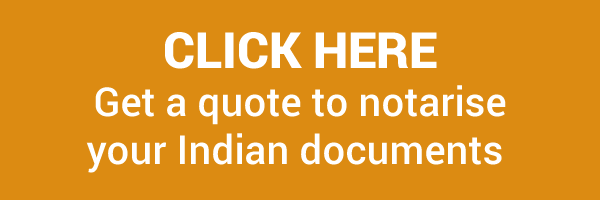VFS provides consular services on behalf of the Indian Consulate to Indian citizens in Australia. For example, if you need assistance with applying for visas, change of personal details (appearance, name or address), renewing your passport, applying for Overseas Citizenship of India, converting your Indian drivers licence, registering or issuing a birth certificate or marriage certificate, or renouncing your Indian citizenship.
If you have been asked to have your documents countersigned by the Indian Consulate, then the process you must follow involves:
Notarise your documents
As a leading provider of notary public services in Sydney, we are regularly asked to notarise documents such as special powers of attorney or general powers of attorney, affidavits and other sworn documents, authorisation letters or copies of public documents.Stamp your notarised documents with an apostille
An apostille is a type of stamp issued in accordance with the international convention known as the 'Convention Abolishing the Requirement of Legalisation for Foreign Public Documents'. Countries that are signatories to the convention will recognise documents stamped with an apostille without any further involvement by their foreign office (called legalisation) - which makes the process adopted by VFS/Indian Consulate as a little unusual.Stamp your documents at VFS
Technically, as India is a signatory to the convention, documents that have been stamped with an apostille by DFAT should be recognised in India without requiring legalisation through the Indian Consulate or VFS. Despite this, if you have been asked to have your documents countersigned by the Indian Consulate, then you must submit your documents to VFS - and depending on the type of document, VFS may require your documents to be stamped with an apostille before they will stamp your documents.Sending notarised documents without apostille or VFS/Consulate stamps
The clear majority of our clients only need to have their documents notarised. They do not need to have their documents stamped with an apostille and they do not need to have their documents stamped by VFS or the Indian Consulate. It seems that having their documents notarised and stamped by a notary public is sufficient. Obviously, this would be the quickest and least expensive process to return your documents to India as it bypasses DFAT and VFS processing times and fees.To obtain a quote on our notary public services for India, please visit http://www.notary-parramatta.com.au/notary-fees/.
Acknowledgements
This blog is supported and maintained by Phang Legal. Phang Legal is a leading provider of notary public services in Sydney. With offices conveniently located in Parramatta, Phang Legal supports and services the Indian community across Sydney with readily available and easily accessible notary public services at highly competitive rates.
For more information regarding notary public services for documents going to India, view our notary publications at http://www.notary-parramatta.com.au/jurisdiction/india-notary/.
Frequently asked questions regarding our notary public services can also be found at http://www.notary-parramatta.com.au/faqs/.
For Hindi to English translation services by NAATI accredited translators, see http://hindi-naati-translation.blogspot.com.au/.

Notary Public
Ern Phang is the solicitor director of Phang Legal and a notary public. Ern regularly writes about his experiences as a notary public, including the kinds of problems and solutions that his clients face when sending documents to India.
IMPORTANT: the information in this article is correct at the time of publication, however the law constantly changes. This means you should always refer to the most recent articles because we try to update this blog on a regular basis with the most current information.

